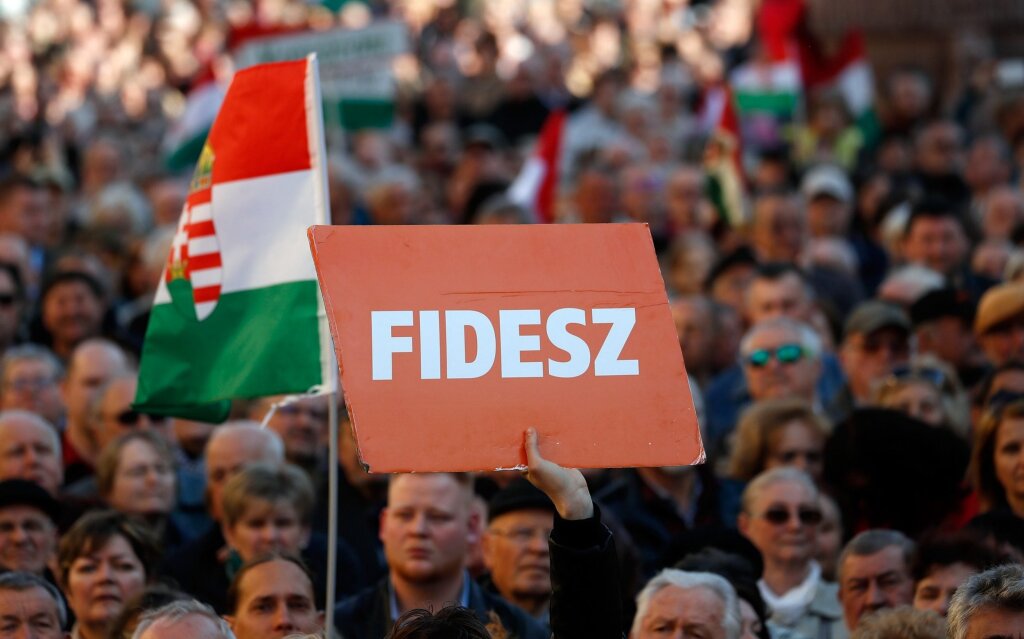Conor O’Dwyer is Associate Professor of political science at the University of Florida. He specializes in comparative politics with an emphasis on postcommunist Europe, and is the author of Coming Out of Communism: The Emergence of LGBT Activism in Eastern Europe (NYU Press, 2018).
Matthew Stenberg is a Ph.D Candidate in Political Science at the University of California, Berkeley.
Democratic backsliding is a global malady, with political and institutional challenges to liberal democracy and the rule of law becoming widespread. Central Europe, in spite of European Union requirements that its members be liberal democracies, is no exception. Recently, right-wing governments in Poland and Hungary have doubled down on their attempts to consolidate long-term regime control. In Poland, Law and Justice (PiS) has continued its assault on the independent judiciary and refused calls to reasonably delay this weekend’s May 10 presidential election amidst the COVID-19 outbreak. While PiS have offered a two year delay, the opposition considers this unreasonable, and the government has changed electoral rules to push correspondence voting through. The latter, an attempt to capitalize on rally-round-the-flag effects to improve president Andrzej Duda’s reelection chances, has led some opposition candidates, former EU Council President Donald Tusk, and nine former Polish Presidents and Prime Ministers to boycott the election. In Hungary, Fidesz has finally discarded the illusion of democracy, using its two-thirds parliamentary supermajority to give Prime Minister Viktor Orbán power to rule by decree—with no end date. Orbán has since issued over 75 decrees, many of which do not relate to responding the crisis.
But how successful will either regime be in limiting future challengers? Most scholars have analyzed democratic backsliding from a national-level perspective. If we turn to local government, however, we can gain insight into the depth of cosolidation and potential regime durability. In local politics, we can observe that Poland and Hungary differ markedly in terms of the dominant party’s capacity to consolidate its hold. Table 1 illustrates this difference, showing the respective electoral success of Fidesz and PiS in contested municipal elections in larger cities immediately before and after taking control nationally.
Table 1. Ruling Party Wins in Municipal Election by Electoral Cycle
Hungary
| Cycle | Year | Elections Won | Winning % |
|---|---|---|---|
| 1 | 2006 | 113 | 53.8% |
| 2 | 2010 | 192 | 63.2% |
| 3 | 2014 | 207 | 69.5% |
Poland
| Cycle | Year | Elections Won | Winning % |
|---|---|---|---|
| 1 | 2014 | 80 | 15.8% |
| 2 | 2018 | 89 | 14.9% |
In Hungary, Fidesz has been able to duplicate its national-level success in municipal elections, winning a majority of the mayoral elections it contests. Soon after taking power nationally, Fidesz instituted changes to the Fundamental Law governing local governments. In the 2014 local elections, Fidesz won 70% of mayoral elections that it contested in Hungarian towns and cities, after winning only 32% in 2002. Ultimately this has helped Fidesz to overcome the traditional success of the Hungarian left in more urban areas.
By contrast, PiS has not been able to replicate Fidesz’s success and has not consolidated its control subnationally. Instead, the opposition has had several well-publicized victories setting up its candidates as potential challengers to the regime.
Why are there such different success rates for Fidesz and PiS candidates in local elections, and what does it tell us about the dynamics of democratic backsliding?
Why local elections matter
Before tackling this question, let’s remind ourselves why local elections matter to democratization.
First, local government reflects the health of democracy in general—a point illustrated even in the Polish word for it, samorząd, which translates literally as self-government. Local government was considered one of the fundamental pillars of democratization by Poland’s Solidarity movement back during its long mobilization against the Communists in the 1980s. One of Solidarity’s first acts in government was a decentralizing reform abolishing regional level organs and passing their competencies to local governments. Decentralization remained a core goal of Solidarity’s political successors after 1989, resulting in a major reform in 1997. Likewise, in Hungary, decentralizing reforms of local government were eagerly instituted in 1990, and functional decentralization was encouraged as part of the process of modernization, Westernization, and EU accession.
Second, local politics matters because, in times of illiberal party dominance, municipal elections are part of the broader battleground between the dominant illiberals and opposition politicians. If the opposition can retain a foothold through winning local elections, they can use it to challenge dominant parties in higher-level arenas later. A dominant party that wins local elections can not only close off this avenue for challenge; it can also use perks to extend its appeal to the electorate and change rules to solidify control. The question is: how can opposition candidates win at the local level?
How can opposition politicians win local elections?
For the sake of argument, let’s simplify political reality into two scenarios. In the first—the world of agency—political outcomes, such as victories in local mayoral elections, are the result of politicians’ strategic choices. In the second—the world of structure—political outcomes are the result of the constraints and possibilities given by the “rules of the game,” and politicians have little control over these, at least in the short term.
What are the conditions for local opposition success in the world of agency? The conventional wisdom holds that success here depends on the opposition candidates’s capacity to cooperate. If they are to defeat dominant-party candidates at the ballot box, they must put aside party differences and unite around one candidate. Otherwise, they will split the opposition vote and ease the dominant-party candidate’s path to victory. This is commonly referred to as a “both ends against the middle” strategy because it unites opposition candidates at both ends of the spectrum around one strong challenger.
Even in the best of circumstances, this both-ends-against-the-middle strategy is hard to pull off. As common sense suggests, the greater the number of opposition candidates in an election, the more difficult coordination and cooperation will be, and the less likely that strategic coalitions will hold together. In postcommunist local politics, it’s typically even harder because parties tend to be under-institutionalized, candidates less professionalized, political resources few, and independent candidates common. While there were some high-profile successes using this strategy in Hungary’s 2019 mayoral elections, Fidesz was hardly ousted from local politics.
Now, let’s imagine what conditions favor local opposition in a world of structure. Here, electoral rules are the critical factor; they constrain every candidate’s behavior and are beyond any candidate’s control. One institutional variation in particular would seem to be critical: the distinction between one-round and two-round systems. In the former, whichever candidate wins a plurality of votes wins the mayoralty: strategic coordination is the opposition’s only option against the dominant party.
In two-round systems, if no candidate wins a majority in the first round, a second round is held, pitting the top two vote-getters in the first round against each other. This institutional variation greatly reduces the need for opposition candidates to coordinate with each other because the first round essentially accomplishes this coordination itself. It doesn’t matter if a lot of candidates split the opposition vote in the first round, providing of course that the dominant-party candidate doesn’t win outright. Having a lot of candidates in the first round may even be advantageous if it means that a stronger challenger to the dominant party emerges from it. Then, if the election goes to a second round, opposition voters will have no possibility of splitting their vote. Even without good strategy, the opposition can win.
Lessons from Hungary and Poland
Hungary and Poland make for an ideal comparison for their many similarities and one key difference. Mayoral elections were instituted in both countries around the same time, 1998 in Hungary and 2002 in Poland. Both Fidesz and PiS are right-wing parties, so they tend to perform relatively poorly in larger urban areas. The key difference is that Poland uses a two-round electoral system for mayoral races, whereas Hungary uses a one-round system. This should significantly advantage Polish opposition candidates vis-à-vis their Hungarian counterparts.
What do we find in our analysis? We know from Table 1 that Fidesz has been a lot more successful in winning mayoral races than PiS, which suggests that electoral institutions are in fact crucial.
But we can go further. Another notable finding is that opposition party strategy—the both-ends-against-the-middle coalition—is even less effective in practice than we expected. In Hungary’s one-round system, we do not find greater odds of opposition success as the number of candidates decreases. In Poland, on the other hand, we find that the greater the number of candidates competing, the lower the odds of a dominant incumbent victory. This, too, goes against the logic of “both ends against the middle,” but it makes sense given the logic of a two-round system, which allows the electoral institutions to select out the strongest opposition candidate to face the dominant-party candidate.
Conclusion
Local politics are a potential weakness for dominant-party regimes, as proving grounds where opposition candidates gain experience and credibility before challenging the regime as a whole. Institutional design may help ensure that a credible opposition can be maintained even when the national government actively interferes with a level playing field. In Hungary, the single-round system relies on the opposition to form difficult, unstable coalitions among candidates with highly disparate ideologies. All the while Fidesz has used its control of city councils to reduce oversight and fair contestation. Meanwhile, in Poland, the two-round system mitigates the need for candidates to coordinate and creates a structural opportunity for the opposition to gain a foothold to combat the ruling party. This more established foothold in local politics may ultimately help the Polish opposition bring down the PiS regime.



